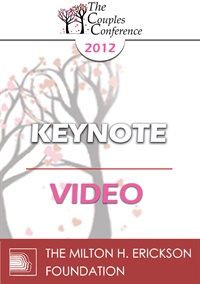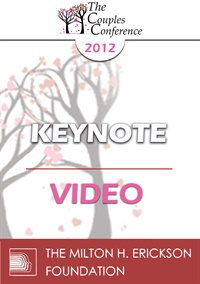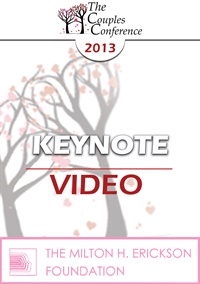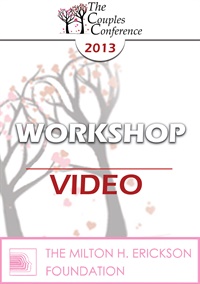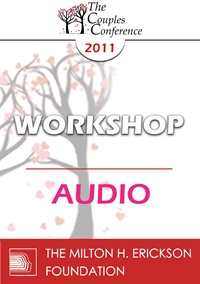
- Average Rating:
- Not yet rated
- Topic Areas:
- Attachment | Couples Therapy | Neuroscience | Workshops | Developmental Therapy Model | Differentiation
- Categories:
- Couples Conference | Couples Conference 2011
- Faculty:
- Ellyn Bader, PhD
- Duration:
- 1:12:19
- Format:
- Audio Only
- Original Program Date:
- Apr 01, 2011
- Short Description:
- Using a developmental lens is powerful to lead couples to make sustained change. Learn to use developmental principles to assess what is wrong and to direct your treatment decisions. Recognize arrested differentiation and see differentiation in action. Videotapes and clinical case examples will be used throughout the workshop to demonstrate how to promote development in hostile and conflict avoidant couples.
- Price:
- $15.00 - Base Price
- Average Rating:
- Not yet rated
- Topic Areas:
- Keynotes | Attachment | Couples Therapy | Neuroscience | Differentiation
- Categories:
- Couples Conference | Couples Conference 2012
- Faculty:
- Ellyn Bader, PhD | Peter Pearson, PhD
- Course Levels:
- Master Degree or Higher in Health-Related Field
- Duration:
- 40:20
- Format:
- Audio and Video
- Original Program Date:
- Apr 27, 2012
- Short Description:
- Drs. Ellyn Bader and Peter Pearson will start the Conference off with a Keynote on why Attachment, Differentiation and Neuroscience matter in Couples Therapy. Skillful integration of these approaches will enable you to more calmly manage couples hostility, outrageous demands and conflict/intimacy avoidance.
- Price:
-
Sale is $29.00
price reduced from Base Price - $59.00
- Average Rating:
- Not yet rated
- Topic Areas:
- Keynotes | Couples Therapy | Love | Neurobiology | Neuroscience | Relationships
- Categories:
- Couples Conference | Couples Conference 2012
- Faculty:
- Helen E. Fisher, PhD
- Course Levels:
- Master Degree or Higher in Health-Related Field
- Duration:
- 58:07
- Format:
- Audio and Video
- Original Program Date:
- Apr 29, 2012
- Short Description:
- Anthropologist Helen Fisher uses her brain scanning studies (fMRI) of people happily in love, rejected in love and in love long-term to discuss the traits of romantic love, love-at-first-sight, and addiction to love. She focuses on her current research on 40,000 men and women to propose that four broad cognitive/behavioral personality trait constellations have evolved associated with the neural systems for dopamine, serotonin, testosterone and estrogen. Then she discusses her data on mate choice among 28,000 individuals to pro-pose why we are chemically drawn to one person rather than another.
- Price:
-
Sale is $29.00
price reduced from Base Price - $59.00
- Average Rating:
- Not yet rated
- Topic Areas:
- Psychotherapy | Keynotes | Intimacy | Mindfulness | Love | Couples Therapy | Neuroscience
- Categories:
- Couples Conference | Couples Conference 2012
- Faculty:
- Rick Hanson, PhD
- Course Levels:
- Master Degree or Higher in Health-Related Field
- Duration:
- 59:50
- Format:
- Audio and Video
- Original Program Date:
- Apr 29, 2012
- Short Description:
- To compensate for the brain’s innate negativity bias – making it like Velcro for negative experiences but Teflon for positive ones, which sensitizes couples to hurts and conflicts and undermines psychotherapy – we’ll explore a vital method in self-directed neuroplasticity: identifying key positive experiences and then registering them deeply in implicit memory.
- Price:
-
Sale is $29.00
price reduced from Base Price - $59.00
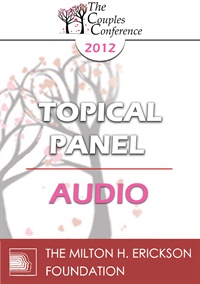
- Average Rating:
- Not yet rated
- Topic Areas:
- Attachment | Couples Therapy | Neuroscience | Topical Panels
- Categories:
- Couples Conference | Couples Conference 2012
- Faculty:
- Rick Hanson, PhD | Harville Hendrix, PhD | Stan Tatkin, PsyD, MFT | Scott R. Woolley, PhD
- Duration:
- 59:38
- Format:
- Audio Only
- Original Program Date:
- Apr 28, 2012
- Short Description:
- CC12 Topical Panel 02 - Bringing Attachment and Neuroscience into Couples Therapy: Benefits, Challenges, and Pitfalls - Rick Hanson, PhD, Harville Hendrix, PhD, Stan Tatkin, PsyD, and Scott Woolley, PhD
- Price:
- $15.00 - Base Price
- Average Rating:
- Not yet rated
- Topic Areas:
- Keynotes | Love | Couples Therapy | Polyvagal Theory | Intimacy | Neuroscience | Relationships
- Categories:
- Couples Conference | Couples Conference 2013
- Faculty:
- Stephen Porges, PhD
- Course Levels:
- Master Degree or Higher in Health-Related Field
- Duration:
- 56:26
- Format:
- Audio and Video
- Original Program Date:
- Apr 20, 2013
- Short Description:
- The Love Code provides a metaphor to explore the neural mechanisms underlying how and why we attach, bond, fall in love and seek out safe and trusted others in an unsafe world. This presentation will explore the body’s need for intimate engagement and social bonding from an adaptive perspective. Within the theoretical context of the Polyvagal Theory, the presentation will illustrate how specific features in our social environment may trigger neurophysiological systems, through a process of “neuroception,” that enables us either to be fearful and disengage or to feel safe and enter enduring intimate relations.
- Price:
-
Sale is $29.00
price reduced from Base Price - $59.00
- Average Rating:
- Not yet rated
- Topic Areas:
- Workshops | Trauma | Couples Therapy | Neuroscience
- Categories:
- Couples Conference | Couples Conference 2013
- Faculty:
- Stephen Porges, PhD
- Course Levels:
- Master Degree or Higher in Health-Related Field
- Duration:
- 1:55:37
- Format:
- Audio and Video
- Original Program Date:
- Apr 21, 2013
- Short Description:
- The workshop will explore how faulty neuroception can have an impact on autonomic regulation and social behavior and how understanding the features that trigger different neuroceptive states (safety, danger, and life threat) can be used as a strategy of treatment.
- Price:
-
Sale is $29.00
price reduced from Base Price - $59.00
Tags: Couples Therapy Neuroscience
- Average Rating:
- Not yet rated
- Topic Areas:
- Neuroscience | Addiction | Keynotes | Love | Couples Therapy
- Categories:
- Couples Conference | Couples Conference 2016
- Faculty:
- Helen E. Fisher, PhD
- Course Levels:
- Master Degree or Higher in Health-Related Field
- Duration:
- 01:55:21
- Format:
- Audio and Video
- Original Program Date:
- May 13, 2016
- Short Description:
- Biological anthropologist Helen Fisher discusses three brain systems that evolved for mating and reproduction: the sex drive; feelings of intense romantic love; and feelings of deep attachment to a long term partner. She then focuses on her brain scanning research (using fMRI) on romantic rejection and the trajectory of love addiction following rejection. She concludes with discussion of the brain circuits associated with long-term partnership happiness and the future of relationships in the digital age—what she calls “slow love.”
- Price:
-
Sale is $29.00
price reduced from Base Price - $59.00
- Average Rating:
- Not yet rated
- Topic Areas:
- Neuroscience | Topical Panels | Couples Therapy
- Categories:
- Couples Conference | Couples Conference 2016
- Faculty:
- Stan Tatkin, PsyD, MFT | Pat Love, EdD | Helen E. Fisher, PhD
- Course Levels:
- Master Degree or Higher in Health-Related Field
- Duration:
- 01:01:00
- Format:
- Audio and Video
- Original Program Date:
- May 13, 2016
- Short Description:
- CC16 Topical Panel 01 - Neuroscience - Helen Fisher, PhD, Pat Love, EdD, and Stan Tatkin, PsyD Panel discussion on neuroscience.
- Price:
-
Sale is $29.00
price reduced from Base Price - $59.00
Tags: Neuroscience Couples Therapy

- Average Rating:
- Not yet rated
- Topic Areas:
- Neuroscience | Attachment | Workshops | Experiential Therapy | Mindfulness | Couples Therapy
- Categories:
- Couples Conference | Couples Conference 2016
- Faculty:
- Rob Fisher, MFT
- Duration:
- 01:54:14
- Format:
- Audio Only
- Original Program Date:
- May 13, 2016
- Short Description:
- Now that you understand the neuropsychology of attachment, how are you going to use it in a session where one partner is yelling at the other for abandoning him/her who is in turn trying to take refuge under the coach? Learn how to put theory into practice using an experiential approach to explore old neural circuitry around attachment and build new pathways. We will be using the present moment and mindfulness integrated into therapy to slow things down and rewire the brain.
- Price:
- $15.00 - Base Price
Please wait ...



